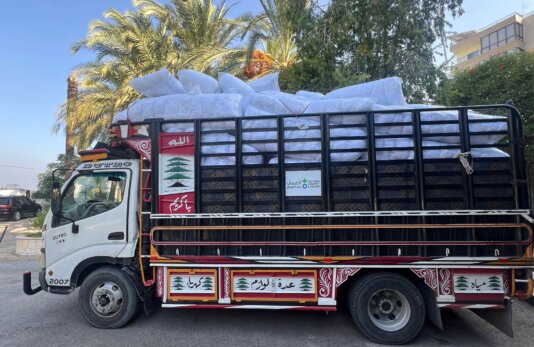
During my five years on the front lines of humanitarian assistance in Lebanon, I have witnessed the country grapple with near-constant stress – hunger, poverty, economic downturn and disease have repeatedly brought the region to its knees. Lebanon is barely back on its feet before being knocked down again.
But previous crises pale compared to the scale of violence in the last few weeks. We are enduring the most intense and deadliest exchange of fire since the 2006 armed conflict between Israel and Hezbollah. Lebanon’s 558 casualties on 23 September alone represent half the total number of deaths experienced in the entire 2006 conflict.
As of 11 October, the Ministry of Public Health reports more than 2,229 fatalities, including at least 104 children and 194 women dead, from airstrikes. The number of people injured has risen to 10,380.
Action Against Hunger and the other humanitarian organisations that remain in the country continue to provide on-the-ground support while struggling to keep up with the increasing level of need.
Since October 2023, our teams in Lebanon have distributed 800,000 litres of drinking water, 105,000 hot meals and provided cash assistance to more than 7,500 displaced people. Still, we are severely underfunded and available resources don’t begin to meet the needs of the people of Lebanon.
It’s estimated that USD 426 million is needed to ensure basic humanitarian assistance in the coming months.
For more than 170 Action Against Hunger staff based in Lebanon, the insecurity directly affects our ability to work and blurs the line between delivering and receiving aid. Airstrikes have closed our office in Tyre, and numerous staff are displaced and currently seeking accommodation. This has meant intense emotional carnage for my team, who is carrying the double burden of their own needs and the needs of the communities we serve.
Nour, a staff member based in the south, moved into her house on her wedding day last year, 8 October, the beginning of the crisis. Her house has since been destroyed. She and her husband had spent years preparing the house and had paid off the mortgage just a month earlier.
Despite the severe limitations on our ability to work, we are continuing to deliver aid, including mattresses, blankets, pillows, water bottles and hot meals. Hygiene kits are available for women and girls, and support systems offer help to people with disabilities. But the escalating pressures and fatigued staff mean hope for Lebanon is dwindling.
As we struggle to meet immediate needs, the long-term impacts of the bombardments are becoming ever more apparent. The displacement crisis, for example, has skyrocketed.
Before the war, Lebanon hosted the highest number of refugees per capita, including 1.5 million Syrian refugees. Now, the United Nations estimates the airstrikes and evacuation orders have internally displaced over 1,200,000 people, including 30,000 children. This is the country’s largest displacement episode in nearly 20 years. For many of the displaced, this is not the first time they have been forced to leave their home due to violence.
Having been shut down since 23 September due to the violence, hundreds of schools have been transformed into temporary shelters for displaced people. Action Against Hunger operates in 85 shelters, and many of the shelters are operating beyond capacity, and overcrowding means poor conditions and rapidly deteriorating sanitation.
Lebanon’s food and agricultural systems have also taken a huge blow: according to the Ministry of Agriculture, over 340,000 farm animals, 47,000 olive trees and 1,800 hectares of farmland have been destroyed. This, combined with distribution disruptions, has driven up food prices and rendered the most basic of food supplies inaccessible.
According to the Food and Agriculture Organization, 23 per cent of affected farmers reported losing their harvest while 72 per cent reported a loss of income, and 185,000 individuals residing in the South and Nabatieh Governorates were experiencing inadequate food intake.
The healthcare system is also pushed beyond the brink. Around 28 health facilities have been closed and shortages of medicine and medical staff mean huge health risks for the population, including a rise in preventable diseases. Already, cases of scabies and lice are exploding in the shelters.
Without intervention, these mounting pressures will continue to grow as Lebanon is forced to absorb increasing trauma. My team and I are working to continue to deliver as much essential aid as possible, but the surest way to achieve safety and stop the spiral of suffering is an immediate ceasefire.
Until this is realised, Lebanon’s future is uncertain and thousands of innocent lives are in jeopardy. The international community should not stand idle while the country and its people are crushed under the weight of continued violence and brutal insecurity.
Suzanne Takkenberg is Action Against Hunger’s Country Director for Lebanon.
Image by Elie Saab, Communication and Advocacy Officer at Action Against Hunger Middle East.


